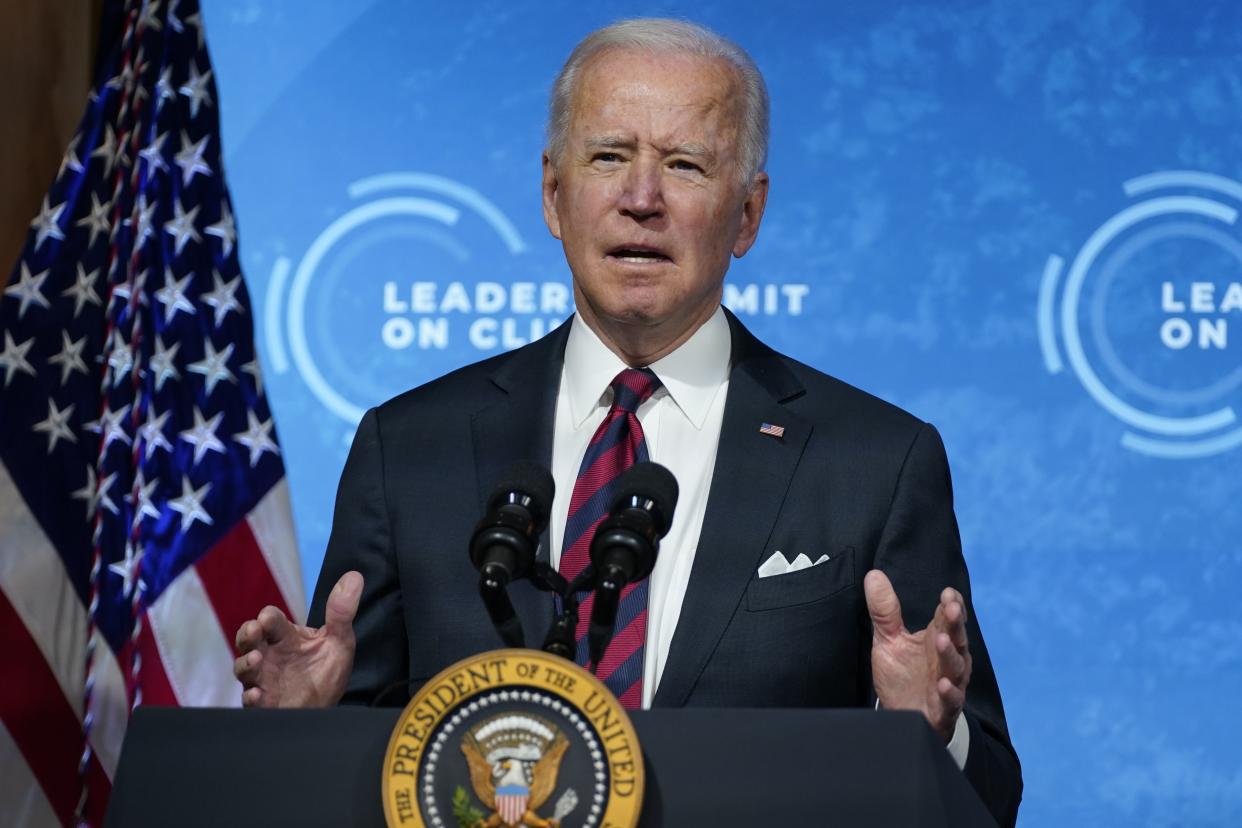Biden vows to cut U.S. emissions in half by 2030, secures some pledges from world leaders at climate summit
Joe Biden kicked off the first climate summit of his presidency Thursday with a pledge to slash U.S. fossil fuel emissions in half by the end of this decade, prompting some world leaders to set similar goals while others — including the strongmen of Russia and China — held off on making new promises.
Biden’s commitment — to cut greenhouse gas output by between 50% and 52% before 2030, as compared to 2005 levels — stood out as the most ambitious one unveiled at the virtually-held summit. It’s also a goal that will require a fundamental restructuring of American energy consumption, manufacturing and other areas of society.
Speaking from a TV studio-style set at the White House, Biden painted his push for action as both a necessity and an opportunity for investing in an economically bountiful future.
“The signs are unmistakable. The science is undeniable,” Biden said to the summit of 40 world leaders listening in via video feed. “The cost of inaction keeps mounting. The United States isn’t waiting. We are resolving to take action.”
The heads of state of Canada, Japan, South Korea, Germany, the United Kingdom and others followed suit, detailing plans to also substantially lower carbon emissions by 2030.
The common long-term goal touted by most attendees, including Biden, is to achieve net zero carbon emissions by 2050.
Biden officials stressed that investing in green energy and clawing back fossil fuel production is sound from an economic perspective, with banks, major corporations and job production already heading in that direction.
“The world is changing. It’s not going backwards,” Gina McCarthy, Biden’s national climate adviser, told reporters after a summit discussion on investing green energy solutions.
Earlier, Biden waxed poetic about blue-collar union workers laying miles of cable for a re-imagined power grid, while American engineers build the next generation of electric cars and roadside charging stations.
“We can take action to build an economy that’s not only more prosperous but healthier, fairer and cleaner for the entire planet,” said Biden, who has presented Congress with a $2.3 trillion infrastructure plan geared at creating millions of climate-friendly jobs.

But China’s Xi Jinping and Russia’s Vladimir Putin — both of whom are locked in tense conflicts with the Biden administration over economic, diplomatic and territorial issues — appeared less committal.
Xi, whose country is the biggest emitter of greenhouse gas in the world, followed by the U.S., reiterated a past pledge to “strive” to “peak” fossil fuel output by 2030 and achieve net neutrality by 2060. That loose timeline suggests Xi isn’t preparing to drastically scale back emissions before 2030.
Putin, meantime, didn’t offer any hard timeline for a fossil fuel draw-down, but opened the door to global cooperation on the existential issue.
“Russia is genuinely interested in galvanizing international cooperation so as to look further for effective solutions to climate change as well as to all other vital challenges,” Putin said.
Biden’s harshest climate policy critics are congressional Republicans, who claim his agenda will wreck the U.S. economy.
“This is quite the one-two punch,” Senate Minority Leader Mitch McConnell (R-Ky.) said as the summit got underway. “Toothless requests of our foreign adversaries ... and maximum pain for American citizens.”
The non-committal stance from China and Russia could prove problematic.
Biden’s summit, which continues Friday, serves as a warm-up act for a November United Nations meeting in Glasgow, where world leaders are expected to ratify new agreements for global action as a follow-up to the 2015 Paris climate accord.
If Russia and China don’t get on the same page as other countries, the fight against climate change could be in jeopardy.
Scientists warn that rising global temperatures caused by coal plants, car engines and other fossil fuel use is already worsening droughts, floods, hurricanes, wildfires and other disasters, and that humans are running out of time to stave off the most catastrophic extremes of global warming.
But John Kerry, the former secretary of state serving as Biden’s special envoy on climate, said he’s confident Russia and China will come to their senses. “We’re in a place where we will have the ability to be able to create enough progress with other countries that those countries are going to come along too,” he said.
Biden’s summit proves a remarkable pivot from the presidency of Donald Trump, who ridiculed climate science and pulled the U.S. out of the Paris agreement.
Some U.S. allies at the summit were explicit about how relieved they are that Trump’s no longer in power.
“I’m delighted to see that the United States is back, back to work together with us in climate politics,” German Chancellor Angela Merkel said. “Because there can be no doubt about the world needing your contribution if we really want to fulfill our ambitious goals.”
